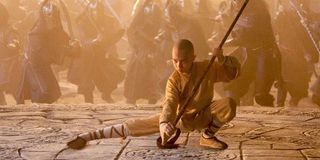Where M. Night Shyamalan Went Wrong: The Last Airbender

After Earth, the new movie from director M. Night Shyamalan, arrives in theaters this weekend…but you wouldn’t know it’s one of his films by watching the trailer. The filmmaker’s name is almost completely absent from the trailers and advertisements, and all this week we here at Cinema Blend are trying to figure out where it all went wrong. Mack blames The Village. Sean cites The Happening , and Eric says Unbreakable is where Shyamalan's cinema went off the rails. Today Kristy tells us why The Last Airbender was her last straw.
By 2010, when the tent pole adventure The Last Airbender was set to premiere, M. Night Shyamalan had become a director know for twists, for better or worse. Okay, mostly for worse. He seemed to have gotten tripped up in the audience's perceived expectations and attempted again and again to pull the rug out from under us as he did with The Sixth Sense, but each time after offered diminishing returns. Still, I liked Unbreakable and Signs well enough. And I was willing to forget The Village, The Happening and Lady in the Lake or whatever it was called, because The Last Airbender was Shyamalan's opportunity to reboot and forget the twists tropes. And he couldn't have asked for a better jumping off point.
Based on a celebrated and cerebral animated series Avatar: The Last Airbender, this movie adaptation already had a fascinating world, fleshed out with a rich mythos, peopled with complex and funny characters, and prime for epic battles utilizing martial arts and elemental superpowers to pull from. All Shyamalan had to do was distill the show's sensational first-season down to a 90-120 minute movie. He had all you could wish for in source material, and yet he failed on every single level.
First off, the film was roundly—and rightly—criticized for being confusing. A premise that the cartoon series set up in a brief intro, Shyamalan spun out again and again in breathy plodding dialogue that failed to get basic world details across to those unfamiliar with the source material, a major fail for any adaptation. What makes this doubly painful is that the show was praised for its witty and spirited dialogue, but Shyamalan clearly has a tin ear. There was a warning sign of this problem when the film's first trailers largely avoided dialogue, and my worst fears were confirmed when the first deeply awkward lines tumbled out of the mouths of its lackluster child stars. They were another problem.
While the original show featured many people of color, Shyamalan inexplicably made his heroes all white. I tried to assume the best of his choice. Maybe it wasn't pandering to Hollywood expectation/convention. Maybe these kids—who happen to be white—who were best for the role. But then I saw the film filled with performances that were infuriatingly wooden from kids who lacked any screen presence whatsoever, and I couldn't give Shyamalan any credit on casting. He picked pretty white kids who couldn't act to play his heroes, then cast people of color (like Slumdog Millionaire's Dev Patel and Aasif Mandvi) to play his villains. It not only made this adventure feel dated and backwards, but also felt like a slap in the face to the source material.
By the end of The Last Airbender I was totally perplexed. How—when he was setup with a world, mythos, characters, action setups, and dialogue—did Shyamalan still manage to wreck this movie? And so atrociously. Hell, he even had his actors mispronouncing characters' names that had been said hundreds of times of the TV show!
It wasn't that he wasn't loyal to the plot of the source material. He was, but his execution lacked any style or spark that would make it worth watching. He stripped away all the color and energy the series had, and so presented something boring and baffling. The only thing spectacular here was the degree to which he failed. (No wonder it has an infamously low Rotten Tomatoes score of 6%!) It was at this point where I realized that Shyamalan wasn't stunted as a filmmaker—repeating the same twisty patterns again and again—he was getting worse. When his name blared on the screen as the film's writer, director, and producer in big obnoxious letters, it became terribly clear he had no idea.
CINEMABLEND NEWSLETTER
Your Daily Blend of Entertainment News
Staff writer at CinemaBlend.
Most Popular








